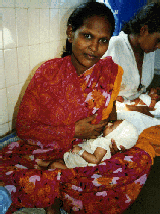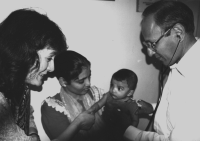India Special Report
From Update Issue 20, February/March 1997
Photo (Philip Rundall): Sion Municipal Hospital in Mumbai, India is Baby Friendly.
The news items which appear on this page are abridged versions of stories which appear in full in the printed version of Update, which is available to members of Baby Milk Action. Membership
costs just £18 waged, £7 unwaged, £25
family, £50 organisations - for members outside the UK there is an extra postage charge. You can join on-line in the Virtual
Shop.
|
|
 |
Contents
India facts
- Population 936 million (1995)
- GNP per capita - US$ 320
- Adult literacy - M:66% F:38%
- Access to health services - 85%
- Infant mortality (under 1 year) - 76/1000 (UK 6/1000)
- Access to safe water - 81%
- Access to adequate sanitation - 29%
- Exclusive breastfeeding 0-4 mths - 51%
- Combined breastfeeding 12-15 mths - 87%, 20-23.99 mths - 66%
Source "The State of the World's Children 1997" - UNICEF, UN Development Programme and DHS 1993
India leads the way as the law takes effect
With nearly a quarter of the world's population living in India, where lack of access to safe water and sanitation puts infants at great risk, breastfeeding is particularly important. The strong Infant Milk Substitutes, Feeding Bottles and Infant Foods Act (the Indian Act) passed in 1992 plays an important role in safeguarding breastfeeding and infant health.
In December 1996 Patti Rundall of Baby Milk Action visited Mumbai (Bombay) and Delhi. She saw how the Breastfeeding Promotion Network of India (BPNI) and the Association for Consumer Action on Safety and Health (ACASH) are coordinating the training of health workers and using the Indian Act to bring about important changes in corporate policies. However, with profits from a baby food market worth £180 m at stake, some companies are reluctant to accept the impact they have on infant health.
Formula free zone - Sion Baby Friendly Hospital
The Sion municipal hospital in Mumbai, which featured in the Yorkshire TV film "Bottle Feeding in India" (contact Baby Milk Action for copies of this), broadcast in the UK in 1995, is one of more than 900 Baby Friendly Hospitals in India. The Sion hospital caters for some of the poorest families in Mumbai, including residents of Asia's largest slum, Dharavi. Approximately 6,000 babies are born in the Sion every year, 30 - 40% of them premature or low-birth weight. Between 1979 and 1986, the Sion used invasive medical techniques such as prelacteal and supplementary bottle feeds, assisted ventilation devices, frequent blood investigations, etc. However, these practices have changed and the hospital has not used any baby milk for the last 10 years. Breastfeeding has been identified as one of the key factors in a reduction in infant morbidity. When bottle feeding was routine 7 out of 10 premature babies died, now at least 8 out of 10 survive. Like all hospitals, the Sion Hospital is badly in need of cash - but any suggestion that they take money from the baby food or drug industry was dismissed by the staff as unthinkable.
Indian doctors reject baby food sponsorship
Aware that parents are receiving confusing messages from doctors, a number of professional organisations in India are tackling the issue of commercial sponsorship head on. After a thorough debate at its annual conference in January 1997, the Indian Academy of Pediatrics overwhelmingly passed a Resolution saying: "The IAP shall not accept the sponsorship in any form from any industry connected directly or indirectly with the products covered by the [Indian ] Act."
The Federation of Obstetrics and Gynaecological Societies of India (FOGSI), with 12,000 members throughout India, also rejects baby food sponsorship, even though massive amounts have been offered. The Federation has declared 1997 to be the FOGSI Breastfeeding Year.
J & J apologises and withdraws
The Indian Act includes all the articles of the International Code and one of its most unique and innovative aspects is its authorisation of voluntary organisations to bring criminal complaints for prosecution. Over the last few years the ACASH has filed criminal complaints against Nestle, Johnson and Johnson and more recently, Wockhardt. The company reactions to these charges has been revealling: As Update readers will know, Nestle has so far refused to apologise and has challenged the validity of the Indian Act.
Johnson & Johnson, in contrast, has submitted a letter of apology to ACASH and has stated that because bottle feeding may not be appropriate in the Indian context it is withdrawing from the market. The Wockhardt case involves its labelling of Dexolac, and the company has issued an apology to ACASH and to the courts.
Abbot Ross cashes in on mothers' worries
 The impact of health claims and "functional foods" on indiginous diets in the developing world is often forgotten. Information which puts too much emphasis on the need for a good diet can cause mothers who live on a low income to doubt the quality of their breastmilk and their local foods, which in countries such as India are affordable and nutritious. US baby food giant Abbot Ross placed an advertisement in the Indian edition of Parenting is for Pramilac, a "low fat specially fortified balanced nutritional supplement" recommended for use throughout pregnancy and lactation. It claims to offer the extra 550 calories that a lactating woman might need daily, without the worry of "loading of fat". The equivalent amount of local food - 60 grams of rice, 30 grams of dhal, half a banana and one teaspoon of oil - would cost less than 3 rupees a day (£1.50 per month). Just one monthÕs supply of Pramilac would cost £25. A female clerk in India who might buy Parenting would typically earn £40 per month. The impact of health claims and "functional foods" on indiginous diets in the developing world is often forgotten. Information which puts too much emphasis on the need for a good diet can cause mothers who live on a low income to doubt the quality of their breastmilk and their local foods, which in countries such as India are affordable and nutritious. US baby food giant Abbot Ross placed an advertisement in the Indian edition of Parenting is for Pramilac, a "low fat specially fortified balanced nutritional supplement" recommended for use throughout pregnancy and lactation. It claims to offer the extra 550 calories that a lactating woman might need daily, without the worry of "loading of fat". The equivalent amount of local food - 60 grams of rice, 30 grams of dhal, half a banana and one teaspoon of oil - would cost less than 3 rupees a day (£1.50 per month). Just one monthÕs supply of Pramilac would cost £25. A female clerk in India who might buy Parenting would typically earn £40 per month.
Each tin of Pramilac carries a coupon for a free booklets and invites a mother to send her personal details to Abbott, presumably for its database. One of the booklets, Breastfeeding your Baby, is appalling and includes bad advice which is likely to cause breastfeeding to fail: "A supplemental bottle may be given when there is a temporary dropping off of milk flow caused by nervous upset or illness... If your baby's appetite is too great for your milk supply, your doctor may want to suggest complemental feeding. An infant milk formula is ideal for such occasions. Of course, you will still want to feed your baby at the breast, but if baby cries after feeding and still seems hungry, the doctor may want you to offer him a bottle."
Write to Abbott Ross to complain and send copies of any letters to us.
Abbott Ross UK: Kirk Davies, CEO, Abbott House, Norden Road, Maidenhead, Berks SL6 4XE (Abbott markets the soya formula Isomil in the UK, and Similac in the USA.)
National creche fund
The Women and Child Development Department at the Indian Ministry of Human Resources has launched a National Creche Fund which is attempting to ensure that all working women in informal employment have access to creche facilities and advice about breastfeeding and sound complementary feeding. 800,000 creches are needed, at present there are 30,000.
Breastmilk - all that was needed
 Mohamed Yusuf, the 5-month old breastfed baby pictured above, was admitted to a hospital in Mumbai in December 1996 suffering from loose motions and fever. The doctor in charge recommended that he be taken off breastmilk and put on to an elaborate programme of Nusobee soya formula, two sets of antibiotics and intravenous drips. His condition did not improve and his mother decided to transfer him to the care of Dr Raj Anand at the Baby Friendly Jaslok Hospital and Research Centre. Mohamed was put back onto breastfeeding and all the medicines were stopped. Within two days he had recovered and was discharged. Mohamed Yusuf, the 5-month old breastfed baby pictured above, was admitted to a hospital in Mumbai in December 1996 suffering from loose motions and fever. The doctor in charge recommended that he be taken off breastmilk and put on to an elaborate programme of Nusobee soya formula, two sets of antibiotics and intravenous drips. His condition did not improve and his mother decided to transfer him to the care of Dr Raj Anand at the Baby Friendly Jaslok Hospital and Research Centre. Mohamed was put back onto breastfeeding and all the medicines were stopped. Within two days he had recovered and was discharged.
Dr Anand, who talked to Baby Milk Action members when he visited the UK last year, advises many women in India who want to breastfeed: "If you do not allow a bottle to come between yourself and your child I am sure that you will be able to breastfeed. If you cannot, I will give up practicing medicine."
(Photo: Philip Rundall) |



